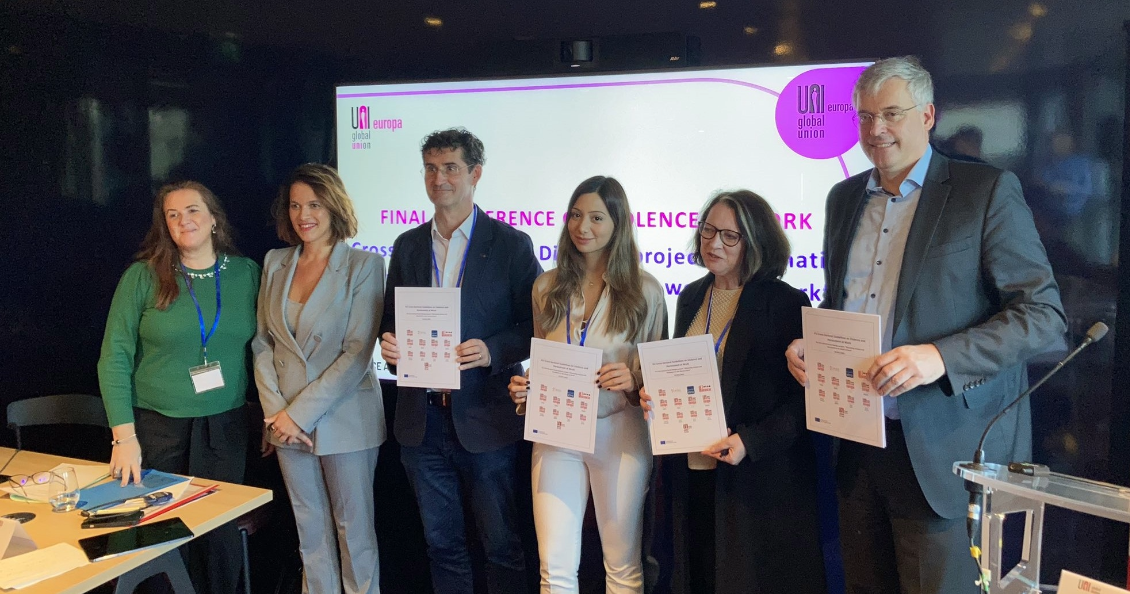UNI Europa and social partners sign first-of-its-kind EU cross-sectoral guidelines on eliminating violence and harassment
08.11.23
UNI Europa and employers in telecommunications, finance and gaming signed first-of-its-kind guidelines on eliminating violence and harassment in the workplace.
At a Conference held in Paris, France, on 7 November UNI Europa, the European services workers federation, and employers in telecommunications, finance and gaming signed first-of-its-kind guidelines on eliminating violence and harassment in the workplace. This is the first time that a trade union federation has signed such far-reaching guidelines with employers across different economic sectors.
The Covid-19 pandemic has led to an alarming increase in violence against women, both physically and online, while they are significantly more isolated from potential resources and opportunities for help. Domestic violence has increased by a third during the pandemic. Evidence also shows that remote working has meant that work-related sexual harassment has become more prevalent online. In a survey commissioned by UNI Europa in which 228 members and trade unions participated, 76% reported forms of verbal harassment, 53% sexual harassment and 52% threats or intimidation as the most widespread forms of abuse in the workplace.
Involving social partners and employers in the process, the European Trade Union Confederation (ETUC) and experts on gender equality, the guidelines signed today are the first tool of its kind to address issues of violence and harassment. As the guidelines state: “The social partners condemn any violence and harassment at the workplace. We have come together to tackle violence and harassment for employees across Europe.” The guidelines are specifically focused on domestic violence as related to the world of work, third-party violence, and psychosocial risks of telework.
Concluding a two-year project co-funded by the European Commission, the guidelines are signed at a moment when the EU institutions edge closer to adopting an EU directive on combating violence against women and domestic violence. It would enshrine minimum standards in EU law for criminalising certain forms of gender-based violence, improve access to justice, protection and support for victims, ensure coordination between relevant services, and prevent these types of crime.
As the guidelines state: “The social partners will continue to assess the development of this Directive to ensure that it includes: the role of trade unions and social dialogue in preventing and combating violence against women in the world of work and beyond, including through collective bargaining”.
Speaking at the Conference, European Commissioner for Equality Helena Dalli said:
“By working closely together, we can achieve our shared objectives and create workplaces where men and women can be free from violence. I thank you for your commitment to eliminating violence and harassment in the world of work.”
Speaking at the Conference, UNI Europa Regional Secretary Oliver Roethig said:
“A few years ago, there was widespread reluctance to address issues of violence and harassment in the workplace. But today, UNI Europa together have signed broad guidelines with its social partners across various sectors – a pioneering moment in the fight for safe workplaces for everyone.”
On European legislative proposals, Roethig added: “UNI Europa and its affiliates are engaging at European and national levels with legislators, especially on the proposed EU directive on combating violence against women and domestic violence. Our key point is that the directive should strengthen the role of social partners and collective bargaining in preventing and combatting violence in the world of work.”
Speaking at the Conference, ETUC General Secretary Esther Lynch said:
“We are in a moment where people are trying to put us women back in a box. But we need to be courageous and demand more rights, not less. These guidelines give us an opportunity to do that.”
Speaking at the Conference, UNI Europa Women’s Committee President Carol Scheffer said:
“UNI is the first trade union federation to address the issue of violence and harassment at work. The guidelines signed today are an historic step towards counteracting violence as well as highlighting psychosocial risks as a direct result of these issues.”
Speaking at the Conference, UNI Global Head of Equal Opportunities Department Veronica Fernandez Mendes said:
“We don’t need to wait until the ILO convention is ratified. At UNI Europa we have developed template clauses to include in collective bargaining agreements.”
Speaking at the Conference, UNI Europa Equal Opportunities Director Amel Djemail said:
“We can be very proud. A few years ago, people didn’t want to address these areas of violence and harassment at work. The best proof that we are pioneers is the draft directive at the European level from last year.”
Further reading:
- Eliminating violence & harassment – UNI Europa (uni-europa.org)
- Twitter thread on the Conference
- The full guidelines
- Online survey on mental health
UNI Europa, the European services workers federation represents 7 million workers across Europe: uni-europa.org
Guidelines
News
UNI Europa


